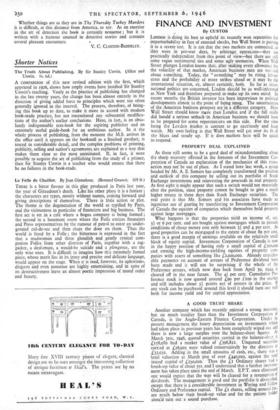FINANCE AND INVESTMENT
By CUSTOS
LONDON is doing its best to uphold its recently won reputation for imperturbability in face of external shocks, but Wail Street is putting it to a severe test. It is not that the two markets are connected, as they were in pre-war days' by arbitrage operations—they are practically independent from this point of view—but there are still some vague sentimental ties and some- ugly memories. When Wall Street plunges London knows that, after making every allowance for the volatility of that market, American -business men are wry:tied about something. Today, the " something " may be rising labour costs and the probability of more strikes ahead or it may be the international situation, or, almost certainly, both: So far as inter- national politics are concerned, Linden should be as well-informed as New York and therefore prepared to make-up its own mind. In recent months. the British investor has been impervious to political developments almost to the point of being smug. The uncertainties of the American business prospect are in a different category. Here Wall Street should know more than London and if the fall really did herald a serious setback -in American business we should have to be prepared for some repercussions on this side. . For the time being the Loudon market is content to go cautiously and keep watch. My own feeling is that Wall Street will get over its fit of the blues and steady up. If it does markets here will be quick to respond.
PROPERTY DEAL EXPLAINED
As there still seems to be a good deal of misunderstanding about the sharp recovery effected in the fortunes of the Investment Cor- poration of Canada an explanation of the mechanics of this trans- action may nof be out of place. As I stated here last week, a group headed by Mr. A. E. Somers has completely transformed the position and outlook of this company by selling out its portfolio of Stock Exchange investments and reinvesting the proceeds in real property. At _first sight it might appear that such-a switch would not materially alter the position, since property cannot be bought to give a much higher return in these days than Stock Exchange -securities. The real point is that Mr. Somers and his associates have made an ingenious use of gearing by transferring to Investment Corporation of Canada the equities of companies which themselves hold property against large mortgages.
What happens is that the properties yield an income of, say, 5+ or 6 per cent, and are bought against mortgages which in present conditions of cheap money cost only between 31 and 4 per cent. As good properties can be mortgaged to the extent of about 8o per cent. there is a good margin of earnings available on the relatively small block of equity capital. Investment Corporation of Canada is now in the- happy position of having only a small capital of L500,000 and owning the high-income-yielding equities of property com- panies with assets of something like £2,000,000. Already consider- able payments on account of arrears of Preference dividend have been made and it will not be surprising if the whore of the Preference arrears, 'which now date back from April 30, 1944, is cleared off in the near future.- per cent. Cumulative Pre- ference stock is now quoted arund L90 per f.too in the market
and still includes about 5-1 points net of arrears in the price. If any stock can be purchased around this level it should turn out well both for income yield and for capital appreciation.
A GOOD TRUST SHARE
Another company which has recently enjoyed a strong recovery, but on much steadier- lines than the Investment Corporation of Canada, is the Anglo-Eastern Finance Corporation. Under its present management the heavy depreciation on investments which had taken place in previous years has been completely wiped out and there is now a large surplus over the balance-sheet figures. At ' March 31st, 1946, quoted securities carried in the balance-sheet at £158,080 had a market value of £396,812. Unquoted securitio carried at £26,905 were valued conservatively by the directors at Z33,o31. Adding in the small amounts of cash, etc., there was a 'total valuation at March 31st of over £440,000, against the total , issued capital of L250,600. Thus the LI Ordinary shares had a break-up value of about 35s. and I understand that a further improve- ment has taken place since the end of March. E.P.T. once eliminated one would expect that the way will be cleared for a resumption of dividends: The management is good and the portfolio is diversified, except that there is a considerable investment in Waring and Gillov; Ordinary and Preference capital. The Li shares, selling -around 235., are much below their• break-up value and for the patient holder shote_cl turn- out a sound purchase.


























 Previous page
Previous page